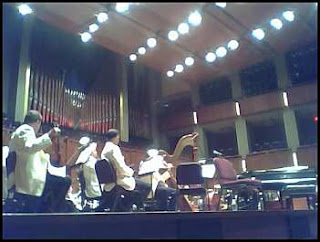One of the great and awe-inspiring things about participating in the national Kennedy Center Partners in Education program is the constant motivation provided by the venue--and its raison d'etre--itself. The Center is the national memorial to President John F. Kennedy; and neither before nor in the 40+ years since his death have we had a President as committed to the ideals of art and creativity as he was.
" . . . I am certain that after the dust of centuries has passed over our cities, we too will be remembered not for vicotries or defeats in battle or politics, but for our contributions to the human spirit . . . "
This JFK quotation adorns an outer wall of the Center; it is also used and referred to in almost every presentation by staff and participants as we discuss how best to spread the word on the power of the arts in student learning.
Because what JFK knew more than 40 years ago now, today data proves: our contributions to the human spirit--our arts and culture, our creativity--is what distinguishes us as people. Students who learn in and through the arts learn and perform better across the board; and most of the "geniuses" of our time were people who, like Einstein, not only excelled at business or science but played a musical instrument. Their creativity and artistry, as fostered through music and arts education, is what powers them to excellence.
There is a whole-school improvement model called Changing Education Through the Arts, and we at the Opera House, in partnership with our local schools and with the help of the Kennedy Center, are excited about the possibility of becoming part of it. Because our kids deserve it. Because our communities and our local economies need it. And because ingenuity is at the core of our lobster fishing culture: so an education based on right brain methods of creativity is going to be a better cultural fit--thereby securing heightened engagement and results from our students--than the ancient, industrial model of public education under which our students currently struggle.
We invite you to learn more about how we can become what we need to be--The Imagine Nation--at the following websites. Read on and be in dialogue with us! Not only, in the words of the National Endowment for the Arts, does "a great nation deserve great art;" but a great nation demands creativity and innovation, and public arts education is the key to getting ALL of us there--not just some of us.
Changing Education Through the Arts
Arts Education Partnership
The Imagine Nation
Tuesday, March 4, 2008
Saturday, March 1, 2008
Tears for Art
 Twice this week I have been moved to tears by overwhelming experiences of art.
Twice this week I have been moved to tears by overwhelming experiences of art.The photo above is from the National Symphony Orcestra in the Concert Hall at the Kennedy Center. As part of our annual meeting, we were treated to tickets of them performing with the multi-genre group, Pink Martini. We were seated, as you can see from this photo, in the front row--closer than I've been in all my years with subscriptions to the NY Philharmonic, etc., except when I was playing! They opened with a classic that was over-played in the 1960s classical cancn: Ravel's Bolero. But the sound--the sheer richness of it, the depth of it, the way it surrounded us and crescendoed and swelled--such power and beauty of a live, symphonic musical experience sent tears cascading down my cheeks. All of the arrangements were by the young, hip Pink Martini members, which had the unionized violins at the rear of the orchestra looking pretty grumpy; but when they played the 1950s film classic, Que Sera, Sera--returning it to its origin at the end of a creepy Hitchcock flick in which Doris Day sings this in response to her son being kidnapped (!)--I again could not help the tears of joy from streaming down my face.
It is a big loss to those of us in rural areas, to not have access to this level of symphonic performance. Sheer power and beauty, overwhelming to the brain and affecting one's heart beyond what one might imagine possible.
Then yesterday, we saw, as part of one of the meeting presentations, a slide show demonstrating student learning around a book, "Martin's Big Words," the life of Martin Luther King, Jr. Again, the clear power of the student learning--their own words, their incorporation of their understanding in their little third grade bodies--blew me away.
We are very lucky to be able to be in an environment with more than 300 people focused on how to improve student learning. It is a rare but much needed environment, for all our communities; in fact, each school board meeting should be the same.
Needless to say, they aren't.
Subscribe to:
Posts (Atom)
